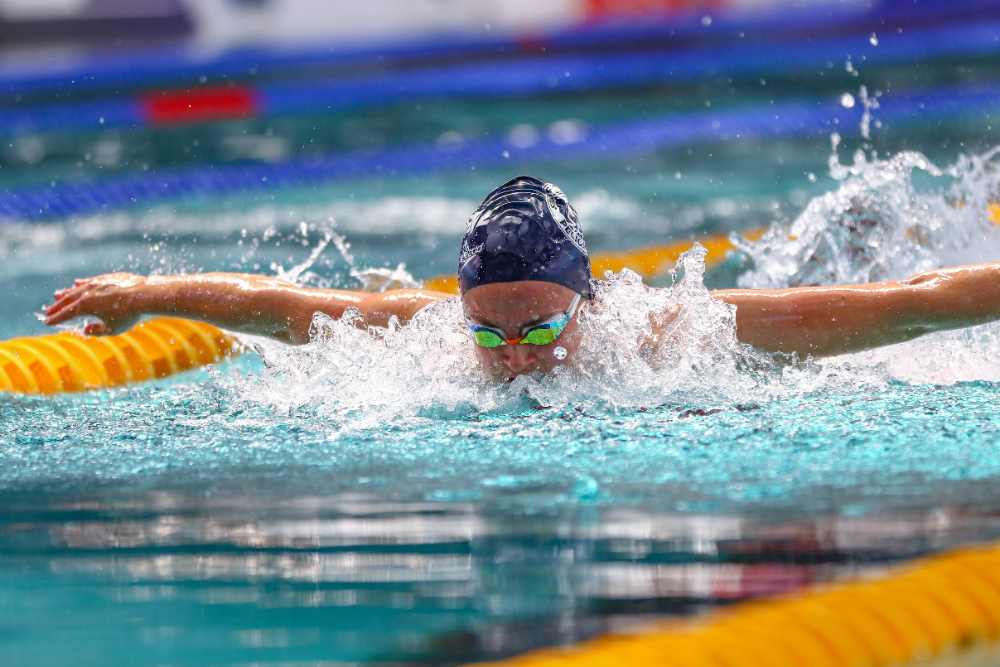Get the most from your time in the pool with these tips for how to care for your swimming goggles.
One of the best tools you have for a good workout at the pool is a set of quality swim goggles.
They help you see the pace clock properly, time flip turns and finishes, and can even protect your eyes from UV rays when swimming outdoors.
But, like all good things, swim goggles have a shelf life.
Whether it’s the straps cracking and breaking, the lenses getting scratched, or the anti-fog layer fading to the point of zero visibility, our goggles can start to fail us.
Fortunately, there are some very easy things you can do to significantly extend the lifespan of your swim goggles.
Let’s dive right in and look at some ways for how to care for swim goggles.
Protect the anti-fog coating.
Every decent set of swim goggles comes with a thin anti-fog coating on the inside of the lenses. This delicate finish helps reduce the accumulation of condensation inside your goggles so that you can swim with crystal-clear vision.
Over 30+ years of swimming, I still find it difficult to not rub the inside of the goggle lens when moisture begins to accumulate.
But rubbing the inside of the goggles with your fingers mid-workout will tear the anti-fog coating off, making the fogging worse.
Use an anti-fog spray (or saliva)
If, like I’ve done countless times, you succumb to that natural goggle-rubbing instinct and peel off most of the anti-fog layer, consider investing in a simple anti-fog spray.
These defogging sprays are super cheap (usually around $6-10 per bottle) and can be used repeatedly on the same swim goggles. Apply the spray quickly before getting into the water.
Another option, which is free and totally organic, is using spit from your mouth to help keep the lenses clear. Sounds goofy, I know, but spit can be a somewhat effective way to keep your swim goggles from fogging up.
Rinse after use
Swimming pools are full of chemicals and the most common one is chlorine. Chlorine is a gangster for helping keep the pool water clean and disinfected.
But at the end of the day, it’s still a solvent, which means over time and with repeated exposure, it will degrade and corrode our swimming equipment (and also cause some of our body hair to thin out).
Once your epic swim workout is completed, give your swim goggles a quick rinse with some freshwater. This step takes just a couple of moments and can be done in the shower when you rinse off the smell of chlorine from your skin.
The main benefit of rinsing your goggles with freshwater is extending the life of the silicone or latex that is used in the head straps. Latex, in particular, thins and stretches from chlorinated pool water.
Store them properly
Finally, we have some basics on proper swim goggle storage.
Let them dry out. Bacteria and mold can grow on soggy swim equipment when stored wet. Give your swim goggles a chance to dry out before tossing them into the depths of your swim bag. Mesh swim bags can be helpful in this situation as they allow some airflow.
Avoid direct sunlight. Although the right lenses for your swim goggles can protect the eyes from glare and UV rays when swimming outdoors, that doesn’t mean you want to leave them out in direct sunlight for hours on end. Latex and silicone are not immune to UV degradation, which can cause the materials to lose color, become rigid and even crack.
Case them. Like sunglasses, swim goggles aren’t immune to scratches. Fortunately, this is a pretty easy situation to avoid. Once your swim goggles have been rinsed and dried, store them in a sunglass case or pouch to prevent them from getting scratched by the rest of your gear in your swim bag.
The Bottom Line
Your swim goggles are one of the best training aids you will have in the pool.
They keep you focused on the pace clock, help you dodge the occasional head-up breaststroker, and they help you perfectly time those flip turns.
Hopefully, this guide helps you take care of the piece of swimming equipment that takes care of you.
More Swim Gear Guides
We’ve got a ton of guides and FAQs on swim goggles on this site. Here are a few more of them:
🏊 Why You Should Wear Swim Goggles at the Pool. The right swim goggles don’t just make you look cool in the pool, but they protect your eyes and help you swim with better technique.
🏊 How to Stop Swim Goggles from Leaking. One of the most frustrating parts of swim goggles is when they leak. Here’s how to troubleshoot this common issue with swimming goggles.
🏊 Should You Wear Swim Goggles Over or Under a Swim Cap? One of the most timeless questions we get from swimmers is where they should position the head straps of their swim goggles. Here’s the perks of both.
🏊 What Swim Goggles Do Olympians Wear? Curious about what kind of goggles the fastest swimmers on the planet wear? Here’s a look at the brands and goggles the best swimmers in the pool use.

Beau Cormier is a former NCAA I swimmer, US Open National finalist, and swim nerd. When not swimming or working for a data company, you can find him running the trails of the Pacific Northwest with his wife and dogs.
